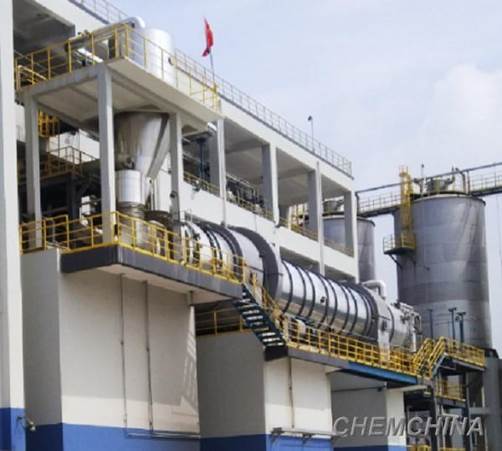At the 30,000-ton/year polyphenylene ether (PPE) project site of Jiangsu Nantong Xingchen Synthetic Materials Co., Ltd. (referred to as Nantong Xingchen), the PPE resin steam-tube rotary dryer, designed and manufactured by Tianhua Institute of Chemical Machinery & Automation Co., Ltd. (referred to as Tianhua Institute), is running smoothly.
In August 2020, the large plant was put into operation, helping Nantong Xingchen produce a new generation of 30,000 tons/year of PPE products with excellent quality and achieve the second largest production capacity in the world.
PPE, one of the five major engineering plastics, features excellent dimensional stability, natural halogen-free flame retardancy, and good dielectric properties. It is an important raw material for strategic emerging industries such as new energy vehicles and integrated circuit chips.
Due to its long production process, complex technology, and high technical barriers, only a few enterprises across the world have mastered the industrial technology of producing 10,000-ton PPE. PPE, one of the engineering plastics with the highest import dependence in China, is listed in the National Development and Reform Commission’s Industrial Policy Guidance Catalogue for Preferential Projects.
In 2005, Nantong Xingchen gave full play to its advantages in R&D and manufacturing of new materials. It built China’s first 10,000-ton industrial PPE plant in Ruicheng County, Shanxi Province, serving as the first enterprise that has localized the PPE material, broke the technical barriers and got rid of the long-term dependence on PPE imports. Over the years, Nantong Xingchen has accelerated its independent R&D and production of PPE, making one breakthrough after another.
However, the core equipment of the drying unit in the plant had not been localized, with several imported American Bepex rake-rod dryers applied. This imported equipment has many disadvantages in the production such as fragile crystals, large investment cost, high energy consumption and slow after-sales services.
How do we make breakthroughs in “bottlenecks”, improve product quality, save equipment investment, speed up the project progress, and break the monopoly of foreign equipment and technologies?
Meeting these challenges began with a business synergy of companies under ChemChina. In 2018, Nantong Xingchen invested in launching a new-generation 30,000 tons/year PPE project in Nantong, Jiangsu province, expanding its production capacity. In the construction of this project, Tianhua Institute and Nantong Xingchen practiced the concept of “science-driven development”. They gave full play to the synergy effect by combining Tianhua Institute’s experience and technical advantages in drying, reaction and process separation, especially in the drying of PPE resin, with Nantong Xingchen’s R&D and manufacturing advantages in the new materials. They has independently developed the new-generation large dryer for the 30,000-ton/year PPE project as a localized research one.
The two sides set up a working group for localizing dryers, with close communication, resources sharing and targeted policies implemented. Technicians started with small experiments, figured out the drying rate, mastered the drying mathematical model, and identified the equipment type and specifications. Then, they exchanged and discussed many times from the process flow, production operation, and product quality optimization. Finally, they determined the parameters of the core equipment required for large-scale production.
During the initial commissioning, a sealing leak occurred in the dryer. For this reason, the technical staff studied the crux of the problem through in-depth analysis and discussions. They improved the sealing structure and process pipeline and optimized operating parameters. The two enterprises complemented each other’s strengths, finally solving the sealing leak in the short period of time.
According to sources, the closed-cycle inert-gas steam rotary drying unit for the PPE plant is characterized by large processing capacity, smooth operation, low energy consumption, high safety and high solvent recovery rate, meeting the needs of large-scale continuous PPE production.
The successful completion of the new-generation 30,000 tons/year PPE project marked that Tianhua Institute has localized the core equipment of the drying unit in the PPE plant. Also, Nantong Xingchen has become one of the few producers across the world that can industrialize two PPE technologies.
Up to now, the PPE dryer designed and manufactured by Tianhua Institute has been running smoothly for more than half a year, helping Nantong Xingchen rank among the top in the world with its total PPE capacity of 50,000 tons/year. With a lowered broken product rate and higher quality stability, the dryer is simple to maintain, featuring a large output of single unit and strong adaptability. With all indicators meeting the production needs, the drying unit replaced the imported equipment, empowering the enterprises to secure a leading position in the PPE industry.
The successful completion of this project has been important experience for Tianhua Institute and Nantong Xingchen in localizing large-scale drying equipment for PPE resin. Without importing dryers, they have made a new breakthrough in the drying for large-scale PPE resin production in China and also set a new model for all enterprises under ChemChina to work hand in hand and overcome difficulties.

Nantong Xingchen’s PPE resin steam-tube rotary dryer is in operation